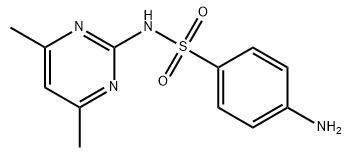Manufacturer Provide CAS 57-68-1 Sulfamethazine 85% Granule

Introduction
1.Product Name: Sulfamethazine
2.CAS NO:57-68-1
3.Purity: 99%min
4.Appearance:White Crystalline Powder
5.Molecular formula: C12H14N4O2S
6.Molecular weight:278.33
7.Melting Point :197 °C
8.Melting Point :294°C
9.Density:1.2997
10.Storage:Keep in dark place,Sealed in dry,Room Temperature
Sulfadiazine is a sulfadiazine anti-infection drug commonly used in Clinical practice in China, also known as sulfadiazine and diazine. Sulfadiazine has a molecular structure similar to p-aminobenzoic acid (PABA), which can compete with PABA to act on dihydrofolic acid synthase in bacteria, thus preventing THE synthesis of folic acid required by bacteria as raw material. It reduces the amount of metabolically active tetrahydrofolic acid, which is essential for the synthesis of purines, thymidines, and deoxyribonucleic acid (DNA), thus inhibiting bacterial growth and reproduction. Sulfadiazine has inhibitory effects on sensitive bacteria such as hemolytic streptococcus, staphylococcus, meniticoccus, Chemicalbook pneumoniae, Neisseria gonorrhoeae, Escherichia coli, dysentery bacillus, chlamydia trachomatis, actinomycetes, plasmodium, Nocardia astrocardia and Toxoplasma gondii. The advantage of sulfadiazine is the effective concentration in the blood is higher, serum protein is combined with the rate is low, the drug is easy to infiltrate the cerebrospinal fluid, it is the first selection drug that cures epidemic meningitis, but in recent years meningitis dicoccus is opposite sulfadiazine and so on sulfadiazine resistant strain increases somewhat (domestic report 20%, abroad report 33% to this article resistant). Those who are resistant to this product can be treated with penicillin. Sulfadiazine's disadvantage is that it is easy to crystallize in the urinary tract, so it needs to be taken with sodium bicarbonate.
Function
1.Used for the prevention and treatment of staphylococcus and dissolved streptococcus infection, hemolytic streptococcus and pleurisy coccus and other bacteria have an inhibitory effect, mainly for the treatment of avian cholera, avian typhoid, chicken coccidiosis and so on.
2.Veterinary drugs, used for analytical testing.
3.An antibacterial sulfonamide drug; CYP3A4 expression was induced and acetylated by N-acetyltransferase. They exhibit sex-dependent pharmacokinetics, which are metabolized by male specific homologous isomer CYP2C11. Inhibition of dihydrofolic acid synthase, achieve the effect of blocking folic acid synthesis.
